The Social Lives of Digital Methods: Encounters, Experiments, Interventions
Digital Methods Winter School, Data Sprint and Mini-Conference 2018
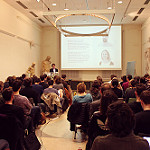
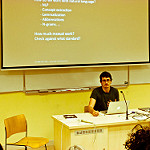
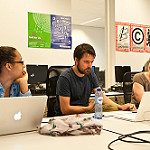
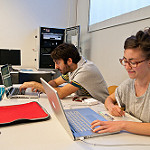
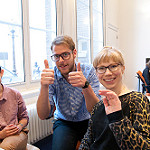
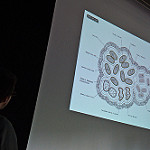
Digital Methods Winter School, Data Sprint and Mini-Conference 2018
8–12 January 2018 Everyday location
Digital Methods Initiative
University of Amsterdam
Turfdraagsterpad 9, 1012 XT Amsterdam
https://wiki.digitalmethods.net/Dmi/WinterSchool2018
bit.ly/dmi18-ws-call
Important Links
| Shortlinks | Description |
|---|---|
| bit.ly/dmi18-ws-call | Call for participation and general information. |
| bit.ly/dmi18-ws-welcome bit.ly/dmi18-ws-welcome-folder |
Main welcome package documents. This includes: a welcome note, general information, the day-to-day schedule, and a map of venue locations, coffee, and lunch places. |
| bit.ly/dmi18-ws-schedule | Day-to-day schedule for the Winter School. |
| bit.ly/dmi18-ws-reader bit.ly/dmi18-ws-reader-folder |
Reader for the Winter School (for participants and students) and a folder with PDF files. |
| bit.ly/dmi18-ws-projects | Descriptions of projects to be pitched on the opening day. |
| bit.ly/dmi18-ws-facebook | Face book of all participants. |
| bit.ly/dmi18-ws-template-gdoc bit.ly/dmi18-ws-template-wiki |
Research project report templates for Google Docs and for the DMI Wiki. (Please find further instructions of use in the welcome package.) |
| bit.ly/dmi18-ws-notes | Collaborative note-taking for the keynotes on the opening day. |
| bit.ly/dmi18-ws-assignment | Project and room assignments |
| #dmi18 | Don't forget to tweet. |
Projects (Work Sessions)
| Project number |
Project title | Project room(s) | Project wiki page(s) | |
|---|---|---|---|---|
| 1 | Mapping the politics of basic income online | BG1 0.13 | Mapping the politics of basic income online | |
| 2 | Think tank networks | BG1 0.13 | Think tank networks | |
| 3 | Mapping data-intensive app infrastructures | OMHP E1.07 | Mapping data-intensive app infrastructures | |
| 4 | Retraining the machine? | BG1 0.14 | Retraining the machine? | |
| 5 | Visual signifiers of distress | BG1 0.12 | Visual signifiers of distress | |
| 6 | Data justice and Singapore’s smart nation | OMHP C2.23 | Data justice and Singapore’s smart nation | |
| 7 | Mind the gap | BG1 0.13 | Mind the gap | |
| 8 | Collaborative archiving of digital art | OMHP E0.13 (Tue–Thu); OMHP C1.23 (Fri) | Collaborative archiving of digital art | |
| 9 | Tobacco tactics on Twitter | BG1 0.13 | Tobacco tactics on Twitter | |
| 10 | #metoo | BG1 0.04 | #metoo | |
| 11 | Public forums and private data | BG1 0.16 | Public forums and private data | |
| 12 | Boundaries of entrepreneurial journalism | OMHP E0.12 (Tue–Thu); OMHP C1.05 (Fri) | Boundaries of entrepreneurial journalism | |
| 13 | The deep vernacular web and the alt right | BG1 0.16 | The deep vernacular web and the alt right | |
| 14 | Memory formation in digital identity politics | BG1 0.16 | Memory formation in digital identity politics | |
| 15 | The new far right landscape in Europe | BG1 0.16 | The new far right landscape in Europe | |
| 16 | Student worksheet: ‘telling data’ | N/A (Optional: OMHP E2.12 (Tue–Thu)) | N/A | |
Digital Methods Winter School, Data Sprint and Mini-Conference
The Digital Methods Initiative (DMI), Amsterdam, is holding its annual Winter School on 'the Social Lives of Digital Methods: Encounters, Experiments, Interventions.' The format is that of a (social media and web) data sprint, with hands-on work for telling stories with data, together with a programme of keynote speakers and a Mini-conference, where PhD candidates, motivated scholars and advanced graduate students present short papers on digital methods and new media related topics, and receive feedback from the Amsterdam DMI researchers and international participants. Participants need not give a paper at the Mini-conference to attend the Winter School. For a preview of what the event is like, you can view short video clips from previous editions of the Summer School in 2015 and 2014. Over the past decade digital methods of various kinds have been put to use by data journalists, national ministries, non-governmental organisations, city governments, media artists, police departments, international organisations, philanthropic funding agencies in the service of a wide variety of projects and objectives. Within the academy digital methods have spread from researchers of the internet, new media and computational culture, leading to encounters and experiments with a wide range of disciplines in the humanities and social sciences, working with their own publics, partners, questions, concerns and modes of inquiry with and about the digital.. That one may intervene with digital methods is clear, but the question concerns the positioning. Extremism and counter-terrorism units may wish to map online networks of groups and individuals. Under which circumstances and with which ethics to act? City governments may be interested in how to use platform data to inform their responses to emerging “gig” and “sharing” economies said to be changing the character of housing, transport and work. When an analyst finds concrete instances of over-renting properties, does one share the findings and if so how? Non-governmental organisations would like to know whether their anti-fossil fuel campaigns are reaching audiences outside of their own bubbles. How to make such questions relevant for academic research? Funders would like an issue area and the stakeholders mapped, but what if one finds that the funders are overdetermining the agenda of the field? How might the style of digital methods work on secure messaging apps vary, depending on whether the audience is critical media scholars, privacy advocates or public institutions? Researchers in fields such as science and technology studies and ethnomethodology have long pointed out that methods are not only used by researchers to study social life, they are also a part of social life (see, e.g. Garfinkel, 1984). This notion has been further elaborated and explored through a more recent agenda on the “social life of methods” (Ruppert, Law, & Savage, 2013). Digital methods and data projects can be used to create not only novel styles of analysis, but also different kinds of “interactivity” (Marres, 2017) – from involving those who are researched in the research process, to different forms of participatory design, public involvement and experimentation. Such encounters may produce changes in the analytical interests and approaches of both researchers and practitioners, and may be considered a substantive part of the research process, rather than a communicative afterthought. At the 2018 Digital Methods Winter School we would like to put forward positioning practices that address working with practitioners together with the projects (and data sets) they bring along. The Winter School has as its goal to take stock and tell stories of interventions and the positionings one was able to take up. How to navigate the space between scholarly research, practitioner expectation and critical output? Additionally the Winter School will make interventions, working together with ‘publics with an ask’.References
- Garfinkel, H. (1984). Studies in Ethnomethodology. Cambridge, UK: Polity Press.
- Marres, N. (2017). Digital Sociology: The Reinvention of Social Research. London: Polity Press.
- Ruppert, E., Law, J., & Savage, M. (Eds.). (2013). “The Social Life of Methods”, Special Issue. Theory, Culture & Society, 30(4), http://journals.sagepub.com/toc/tcsa/30/4
Digital Methods Mini-Conference at the Winter School
The annual Digital Methods Mini-Conference at the Winter School, normally a one-day affair, provides the opportunity for digital methods and allied researchers to present short yet complete papers (5,000-7,500 words) and serve as respondents, providing feedback. Often the work presented follows from previous Digital Methods Summer Schools. The mini-conference accepts papers in the general digital methods and allied areas: the hyperlink and other natively digital objects, the website as archived object, web historiographies, search engine critique, Google as globalizing machine, cross-spherical analysis and other approaches to comparative media studies, device cultures, national web studies, Wikipedia as cultural reference, the technicity of (networked) content, post-demographics, platform studies, crawling and scraping, graphing and clouding, and similar.Applications: Key Dates
The deadline for application is 7 December 2017. To apply please enter on the secure website a letter of motivation, your CV (including postal address), a headshot photo, 100-word bio as well as a copy of your passport (details page only). Alternatively you may send those materials along to winterschool [at] digitalmethods.net. Notifications of acceptance will be sent on 8 December. If you are participating in the mini-conference the deadline for submission of your paper is 2 January. The mini-conference takes place on Friday 12 January 2018. Please send your mini-conference paper to winterschool [at] digitalmethods.net . To attend the Winter School, you need not participate in the mini-conference. The full program and schedule of the Winter School and Mini-conference are available on 4 January 2018.Tuition Fees, Accommodations & Other Logistics
The fee for the Digital Methods Winter School 2018 is EUR 595, and upon completion all participants receive certificates (and 6 ECTS). To complete the Winter School successfully all participants must co-present the final presentation and co-author the final project report, evidenced by the presentation slides as well as the final report itself. Bank transfer information is sent along with the notification on 8 December 2017. Participants must pay the fee by 13 January 2018. Students at the University of Amsterdam do not pay fees. Participants from LERU as well as U21 universities receive a tuition waiver of EUR 500. Dutch universities in LERU and U21 unfortunately are unable to receive the tuition waiver. The Winter School is self-catered. The venue is in the center of Amsterdam with abundant coffee houses and lunch places. Participants are expected to find their own housing (airbnb and other short-stay sites are helpful), or we have available accommodations at the Student Hotel: The Student Hotel AmsterdamJan van Galenstraat 335
1061 AZ Amsterdam, The Netherlands
Tel: +31 20 760 4000
(Arrival: 7 January 2018; Departure: 12 January 2017)
https://www.thestudenthotel.com/amsterdam-west If you would like to have accommodations at the Student Hotel, please write to the student hotel directly. To avoid disappointment, please write to them as early as possible. Ask the hotel for the Digital Methods Winter School discount. The Winter School closes on Friday with a festive event, after the final presentations. Here is a guide to the Amsterdam new media scene. For further questions, please contact the local organizer, Fernando van der Vlist at winterschool [at] digitalmethods.net. Please bring your laptop computer, your European plug as well as the VGA adaptor for connecting to the projector.
About DMI
The Digital Methods Winter School is part of the Digital Methods Initiative (DMI), Amsterdam, dedicated to developing methods for Internet-related research and the study of the natively digital. The Digital Methods Initiative holds the annual Digital Methods Summer Schools (ten to date), which are intensive and full time, 2-week undertakings in the summertime. The 2018 Summer School will take place from 2–13 July. The Digital Methods book (MIT Press, 2015) provides an introduction to the methodological outlook that frames and informs the work of the DMI. This is accompanied by a companion volume about mapping social and political issues with digital methods: Issue Mapping for an Ageing Europe (Amsterdam University Press, 2015), which is also freely available on the web as an open access monograph. Further information and resources about digital methods can be found at digitalmethods.net - including links to example projects, publications and tools as well as an introductory "founding narrative" about the Digital Methods Initiative and details about associated researchers. The coordinators of the Digital Methods Initiative are Dr. Sabine Niederer (Amsterdam University of Applied Sciences) and Dr. Esther Weltevrede (New Media & Digital Culture, University of Amsterdam), and the director is Richard Rogers, Professor of New Media & Digital Culture, University of Amsterdam.About Digital Methods as a Concept
Digital methods is a term coined as a counterpoint to virtual methods, which typically digitize existing methods and port them onto the Web. Digital methods, contrariwise, seek to learn from the methods built into the dominant devices online, and repurpose them for social and cultural research. That is, the challenge is to study both the info-web as well as the social web with the tools that organize them. There is a general protocol to digital methods. At the outset stock is taken of the natively digital objects that are available (links, tags, threads, etc.) and how devices such as search engines make use of them. Can the device techniques be repurposed, for example by remixing the digital objects they take as inputs? Once findings are made with online data, where to ground them? Is the baseline still the offline, or are findings to be grounded in more online data? Taking up these questions more theoretically (but also practically) there is also a Digital Methods book (MIT Press, 2013) as well as a complementary Issue Mapping book (Amsterdam University Press, 2015), and other digital methods publications.Social
We are using the #DMI18 hashtag as the backchannel for communication (to use a throwback term for Twitter usage). Some pictures from Winter School 2015. Here is the Facebook Group from one year, and from the last Summer School. Here are pictures from a variety of DMI Summer and Winter School flickr streams.This topic: Dmi > WinterSchool2018
Topic revision: 25 Jan 2018, JedeVo
Topic revision: 25 Jan 2018, JedeVo
 Copyright © by the contributing authors. All material on this collaboration platform is the property of the contributing authors.
Copyright © by the contributing authors. All material on this collaboration platform is the property of the contributing authors. Ideas, requests, problems regarding Foswiki? Send feedback